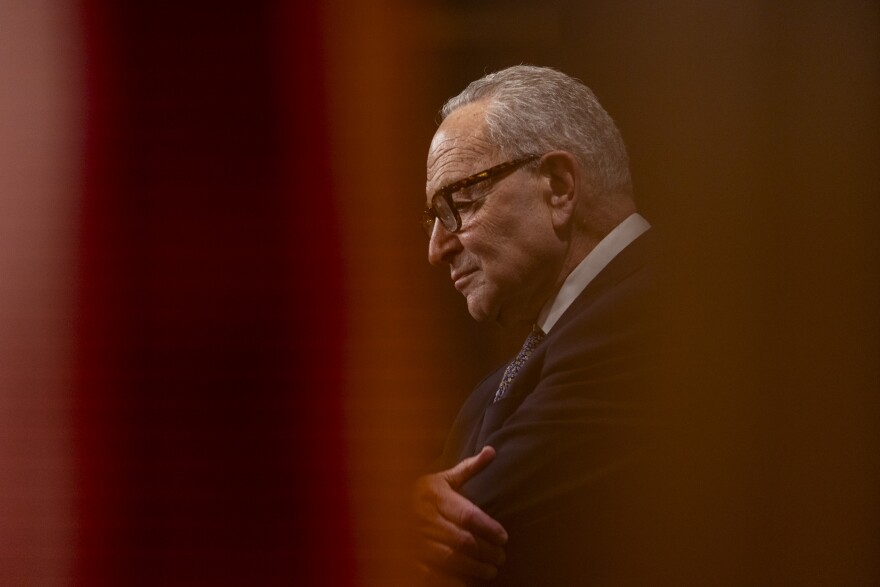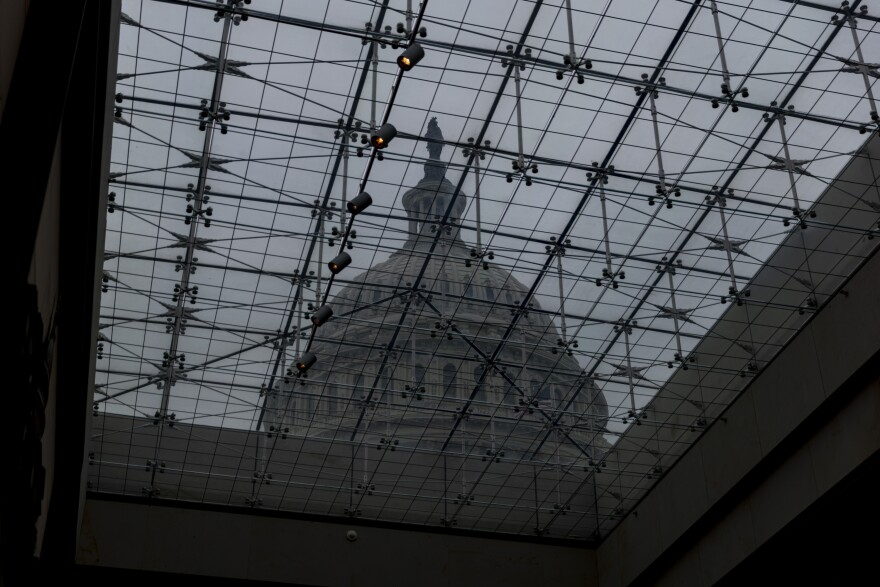This story was reported and written by VPM News.
Virginia stands to bear significant impacts from the federal government shutdown that went into effect at 12:01 a.m. Wednesday, after the US Senate failed to reach a deal on a continuing resolution that would fund the government for an additional seven weeks.
The shutdown is slowing or halting many government services, although key areas like the US Postal Service and aviation safety will remain in action. Social Security and veterans' benefits are still going to be paid out, though checks could be delayed; other benefits, like federal food assistance programs, are in a more precarious position.
(NPR and its member stations broke down how people are likely to feel the effects of the shutdown nationwide.)
The commonwealth has the third-largest contingent of federal workers in the US — nearly 150,000, according to data from the Office of Personnel Management. Many of those workers will be furloughed, but others are expected to work without pay through the shutdown. But if the government is closed for more than a month, those employees will have to wait to be reimbursed until after it reopens.
Additionally, Republican President Donald Trump has threatened to use the shutdown to institute significant reductions in force, laying off workers across the federal government.

US Sens. Tim Kaine and Mark Warner, both Democrats, voted for the Democrat-led funding bill and against the Republican-led continuing resolution. Kaine said during a video call with reporters Wednesday, about 12 hours into the shutdown, that a bipartisan group of senators was working to find solutions to issues related to health care coverage.
"The door is open to finding a solution." Kaine said. "We're looking for a short-term solution, as we continue the longer-term dialogue."Kaine added that he would be open to a 45-day federal funding extension if Republicans agreed to two key concessions.
The first was that the GOP get commitments from the Trump administration to honor any agreements made by Congress: "The deal is a deal. The president should not be able to tear it up once the ink is dry."
Democrats are also seeking an agreement from congressional Republicans to provide more health care funding and stop cuts to Medicaid, as well as prevent higher health insurance premiums.
The junior senator said Virginians will most likely notice the shutdown's impacts when they have difficulties receiving services from government agencies such as the Social Security Administration and the Veterans Affairs, Health and Human Services, and State departments.
The US Postal Service has confirmed that it will remain in operation during the shutdown. The Internal Revenue Service released a plan Monday that indicated that it would remain open for the first five business days. Some VA benefits will continue, including medical appointments at VA health centers, while other support services will be halted.
During a virtual press conference Wednesday, Warner echoed Kaine's hope that a bipartisan conversation could help bridge the gap, but said that he's heard support from federal workers who have felt threatened by the Trump administration.
"The overwhelming majority of federal workers who have been in touch with me over the last few weeks have said they feel like they've been in a continuous shutdown already for the last seven months," he said. "They feel like they've never been under more assault, and they want us to push back."
Warner suggested that Trump is possibly "looking forward" to using the shutdown as cover to fire federal workers without cause, referencing language used by Russell Vought, director of the Office of Management and Budget.
According to video obtained by ProPublica and Documented, Vought said at a 2023 event for the "pro-Trump think tank" Center for Renewing America that he wanted federal bureaucrats to "be traumatically affected" and to "not want to go to work because they are increasingly viewed as the villains."
Republican Gov. Glenn Youngkin had a different view of events. Speaking at a topping-out ceremony at Lego's upcoming Chesterfield County facility, he called it the "Schumer shutdown" — a reference to US Senate Minority Leader Chuck Schumer (D–N.Y.) — and accused Democrats, including Kaine and Warner, of having a "desire to hold America hostage."

"The best way for us to resolve this is for the Senate Democrats to come in, vote to reopen the government, fund the government, get back to work and then spend the next seven weeks sorting out their budget issues," he said.
Youngkin added that WIC, a food assistance program aimed at women, infants and children, could be interrupted, but that the Supplemental Nutrition Assistance Program, the country's largest food assistance program for low-income Americans, is expected to continue along with Medicaid benefits.
Abigail Spanberger, a former congresswoman and the Democratic candidate running to succeed Youngkin, said in a statement that the shutdown was the latest in a series of harmful federal actions.
"Virginians are already facing the dire impacts of DOGE, reckless tariffs, and attacks on their healthcare coverage," she said. "And now, our Commonwealth faces totally unnecessary job cuts as President Trump promises to enact mass firings."
Spanberger added that her Republican opponent, Lt. Gov. Winsome Earle-Sears, was "given multiple opportunities to publicly ask the President to stop further cuts to Virginia jobs" and "outright refused to do so" — an apparent reference to Earle-Sears' appearance on NBC's Meet the Press Now on Tuesday.
In that interview, Earle-Sears said that Kaine, Warner and Spanberger — who does not currently hold public office — would bear the blame if Trump laid off additional federal workers in Virginia during the shutdown. Earle-Sears seemingly declined to answer when asked whether she would call on the president to pledge not to cut any more federal jobs.
She also reiterated a common message from the campaign trail: that the Youngkin administration has created 250,000 new jobs in Virginia that could accommodate any federal worker that loses their job or wants to leave the public sector. Experts have expressed doubt that the skill sets for laid-off federal workers overlap with the open jobs.
In a statement Wednesday, Earle-Sears said Kaine and Warner were making a "reckless decision that puts Virginia families, workers, and the economy at risk."
"Virginians did not vote for this," she said. "[Kaine and Warner] chose politics over people and left families wondering how they'll pay their bills. At a time when Virginians need leadership, they chose to play games."
In a statement Tuesday night, Virginia Congresswoman Jennifer McClellan (D–4th) rejected the notion that Democrats were the cause of the shutdown.
"Republicans control both chambers of Congress and the White House. They had every tool at their disposal to avoid a government shutdown," she said. "Yet their actions, or lack thereof, these past few weeks have caused immense uncertainty for millions of Americans and their livelihoods, amidst a health care and affordability crisis of their own making."
McClellan added that the health care–related effects of the shutdown would not only be felt by people who lose Medicaid coverage as a direct result of federal cuts.
"Health care costs for the rest of us will rise and providers will close or cut services," she said. "This goes beyond insulting — it's cruel."
State Sen. Creigh Deeds (D–Charlottesville) told VPM News that in the short term, "a whole lot of people are going to be inconvenienced because they're not going to get the checks they need to support their families and pay their bills."
That's largely due, he said, to a shift in the primary drivers of Virginia's economy over the last 85 years: "In 1940, when we were on the precipice of World War II, the two most populous counties in Virginia were Pittsylvania and Wise. Our economy was natural resources, tobacco and coal and manufacturing. Since the end of World War II, our economy has basically been driven by federal spending by the federal government."
But Virginia's major employers and industries are different now.
"We have a huge military presence. We have a huge defense contracting presence. We have a lot of federal employees in Northern Virginia," Deeds said. "It's not just Northern Virginia. It's all over the state."
Richmond Mayor Danny Avula said in a press conference Wednesday that while most of the shutdown's effects on Virginia's capital city remain unclear, he's concerned about what a prolonged shutdown could mean for Richmonders' access to federally funded health care programs and food assistance such as WIC and SNAP.

"If this goes on longer, yes, I do have concerns," Avula said. "I think primarily the hit will happen to federally funded employees. When I was at the state, you know, some of the divisions of the health department, like WIC services as an example, those employees went on furlough for about a month back in 2018."
Avula told reporters that his administration is assessing the potential impacts to government services, but said he's confident that the city can weather the potential ramifications in the short term with the help of state partners.
Copyright 2025 VPM News

